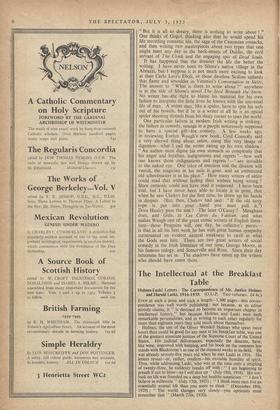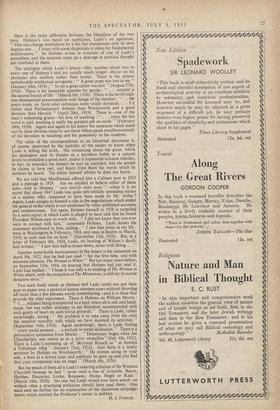The Intellectual at the Breakfast Table
Holmes-Laski Letters : The Correspondence of Mr. Justice Holmes and Harold Laski, 1916-1935. (O.U.P. Two volumes. £4 4s.) EVEN at such a price and such a length-1,500 pages—this corres- pondence was well worth publishing : not because, as its editor piously claims, it " is destined to become an important chapter in intellectual history," but because Holmes and Laski were both remarkable personalities, and in writing to each other regularly for more than eighteen years they told much about themselves. Hohnes, the son of the Oliver Wendell Holmes who spent more hours than could be good for any man at his breakfast table, was one of the greatest associate justices of the Supreme Court of the United States. His judicial deliverances, especially the dissents, have, like wine, improved with keeping, and his book on the common law stands with Blackstone's as one of the classical works in its field. He was already seventy-five years old when he met Laski in 1916. His letters reveal—or, rather, confirm—his enviable humility of spirit. Thus, while addressing Laski, who was at the time only a stripling of twenty-three, he suddenly breaks off with : " I am beginning to preach if not to blow—so I will shut up " (July 19th, 1916). His out- look on life was founded on a deep but healthy scepticism : " I don't believe in millennia " (July 17th, 1925) ; " 1 think more men live an essentially animal life than you seem to think " (December 18th, 1929) ; " The world changes very slowly—you optimists must remember that " (March 27th, 1930). Here is the main difference between the liberalism of the two men. Holmes's was based on scepticism, Laski's on optimism. " One can change institutions by a fiat but populations only by slow degrees and ...I listen with some skepticism to plans for fundamental amelioration." So Holmes writes in criticism of one of Laski's pamphlets, and the sentence sums up a cleavage in political thought not confined to them.
. The sidelights which Laski's letters-they number about two to every one of Holmes's and are usually much longer-throw on his character also confirm rather than reveal. There is his almost unbelievable intellectual arrogance : " A great pope was lost in me " (January 10th, 1918) ; " In me a great editor was lost " (August 27th, 1918). There is his insatiable appetite for gossip " . . . scandal is the second breath of life " (March 6th, 1920). There is the terrifyingly one-dimensional preoccupation with things of the intellect : " . the poets waste on form what substance more vitally demands. . . . I'd rather read Parliamentary debates than Wordsworth and a good decision than Herrick " (April 20th, 1919). There is-one of the man's redeeming graces-his love of teaching : " . . . when the last word is said, teaching is really the greatest job on earth " (February 18th, 1920). Again and again in his letters the sentences which stand out by their obvious sincerity are those which speak unselfconsciously of his' evotion to teaching and his generosity to his students.
The value of the correspondence as an hiStorical document is, of course, destroyed by the inability of the reader to know when Laski is telling the truth. His romancing about the great, which his apologists seek to dismiss as a harmless foible or a natural 'desire to embellish a good story, makes it impossible to know whether, in fact, he attended the dinners he says he attended, met the people he claims to have met, and heard from them the words which he declares he heard. The editor himself admits he does not know.
We are told that MacDonald offered him a Cabinet post in 1923 and a peerage in 1929. Are we entitled to believe either of these tales-told to Holmes " very strictly entre nous "-when it is no secret that about 1947 Laski was quite untruthfully spreading stories of a similar offer, supposed to have been made by Mr. Attlee ? Again, Laski assigns to himself a role in the negotiations which ended the general strike which is not confirmed by other published accounts and reminiscences. Yet again, Holmes himself in 1928 is surprised by a news report in which Laski is alleged to have said that he found President Wilson easy to work with. " I did not know that you ever were in contact with him," comments Holmes. Laski denies the statement attributed to him, adding : " I saw him twice in my life : once in Washington in February, 1918, and once in Boston in March, 1919, in each case for an hour " (November 13th, 1928). But, in a letter of February 4th, 1924, Laski, on hearing of Wilson's death, had written : " I saw him half-a-dozen times, never with liking. . .."
Another remarkable inconsistency in the letters is his statement on April 5th, 1922, that he had just read " for the first•time, and with immense pleasure, The Woman in White." But not many years before, on September 13th, 1916, on hearing that Holmes had just read it, Laski had replied : " I hope it was only a re-reading of The Woman in White which, with the exception of The Moonstone, is still my favourite detective story."
Two such lively minds as Holmes and Laski could not put their pens to paper over a period of almost nineteen years without throwing off more than a fen/ phrases worth remembering-and it is these that provide the chief enjoyment. There is Holmes on William Morris : " I I. .. relished being transported to a land where all is oak and hand- made, but was rather unhappy to see Socialism recommended with such gaiety of heart on such trivial grounds." There is Laski, rather surprisingly, saying : " My problem is to take away from the state the superior morality with which we have invested its activities " (September 16th, 1916). Again surprisingly, there is Laski finding " every social panacea ... a prelude to social disillusion." There is a provocative quotation from Morley : Democracy began when Joe Chamberlain was sworn in as a privy councillor" (July 6th, 1921). There is Laski's summing up of Bertrand Russell as " at bottom a Voltairean whig " (January 22nd, 1922). And there is a lovely sentence by Holmes on Wordsworth : " He stumps along by your side, a bore in a brown coat, and suddenly he goes up and you find that your companion was an angel " (March 4th, 1926).
But the peach of them all is Laski's sneering criticism of Sir Winston Churchill because he had " never read a line of Aristotle, Bacon, Hobbes, Descartes, Locke, Rousseau, Hume, Hegel or Kant " (March 19th, 1928). No one but Laski would ever have asked-or wished-that a practising politician should have read them. One need seek no further for an explanation of the disastrous misjudge- ments which marked the Professor's career in politics.
H. J. FAIRLIE.



























































 Previous page
Previous page